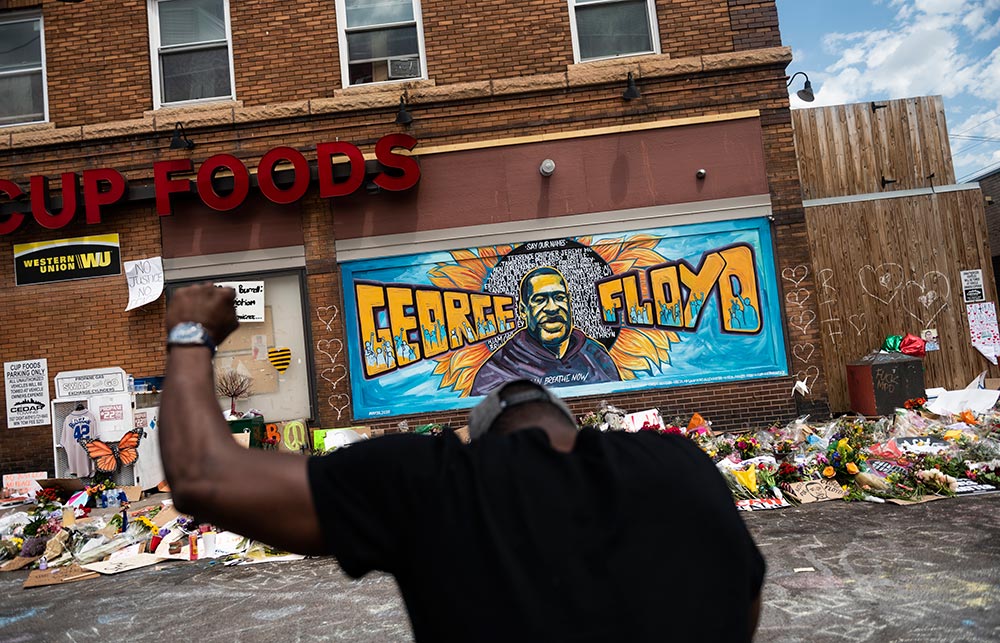
美股三大股指周二悉數(shù)上漲。截至收盤(pán),道指漲267.63點(diǎn),報(bào)25742.65點(diǎn),漲幅為1.05%;納指漲56.32點(diǎn),報(bào)9608.37點(diǎn),漲幅為0.59%;標(biāo)普500指數(shù)漲25.09點(diǎn),報(bào)3080.82點(diǎn),漲幅為0.82%。
本周末,在喬治?弗洛伊德因明尼阿波利斯警察暴力執(zhí)法死亡之后,美國(guó)多個(gè)城市爆發(fā)抗議活動(dòng),導(dǎo)致社會(huì)動(dòng)蕩加劇。盡管如此,投資者基本上沒(méi)有受到大規(guī)模抗議活動(dòng)的影響,相反,他們對(duì)經(jīng)濟(jì)復(fù)蘇持樂(lè)觀的態(tài)度。
金融咨詢公司愛(ài)德華?瓊斯(Edward Jones)的奈拉?理查德森表示:“市場(chǎng)能夠坦然面對(duì)政治局面的變化,以及全國(guó)剛剛解除封鎖之后的經(jīng)濟(jì)狀況。其中一個(gè)原因是,市場(chǎng)是有前瞻性的,市場(chǎng)不會(huì)只關(guān)注當(dāng)前的狀況。”
美股市場(chǎng)延續(xù)了上周的上漲趨勢(shì),因?yàn)樵S多州的緩慢重啟和略有升高的制造業(yè)數(shù)據(jù),讓投資者感到樂(lè)觀。供應(yīng)管理協(xié)會(huì)(Institute for Supply Management,ISM)周一公布的5月份制造業(yè)指數(shù)從4月份的41.5提高到43.1,結(jié)束了連續(xù)4個(gè)月萎縮。另外,雖然吉利德科學(xué)(Gilead Sciences)等公司的抗病毒藥物測(cè)試結(jié)果令人失望,但禮來(lái)(Eli Lilly)宣布其新型冠狀病毒抗體產(chǎn)品已經(jīng)開(kāi)始人體試驗(yàn)。
從大規(guī)模失業(yè)到弗洛伊德和其他非洲裔美國(guó)人遭警察致死在全國(guó)引發(fā)的公憤,這些可怕的消息似乎并沒(méi)有對(duì)股市產(chǎn)生影響。市場(chǎng)觀察家們可能依舊無(wú)法理解出現(xiàn)這種情況的原因。
愛(ài)德華?瓊斯的理查德森認(rèn)為,市場(chǎng)一直關(guān)注的是美聯(lián)儲(chǔ)和聯(lián)邦政府提供的前所未有的財(cái)政響應(yīng)和支持措施,“而不是國(guó)家近期的挑戰(zhàn),比如失業(yè)率激增和第二季度GDP下滑等經(jīng)濟(jì)挑戰(zhàn),以及在大選年國(guó)內(nèi)出現(xiàn)的分裂和兩極化反應(yīng)等政治挑戰(zhàn)。”
歷史影響
投資研究公司New Constructs的CEO戴維?特雷納在周一發(fā)布的一篇報(bào)告中表示,歷史上,“社會(huì)動(dòng)蕩問(wèn)題對(duì)股市的長(zhǎng)期影響微乎其微。”
以前發(fā)生社會(huì)動(dòng)蕩和抗議活動(dòng)時(shí),市場(chǎng)基本上不會(huì)受到混亂事件的干擾。1968年馬丁?路德?金遇刺之后,在他去世當(dāng)天股市曾短暫下行,從4月4日到4月5日下跌了0.5%,但截至4月11日股市卻上漲了約3.5%。1992年,毆打摩托車(chē)手羅德尼?金的警察被無(wú)罪釋放引發(fā)騷亂,同樣沒(méi)有擾亂股市行情。從4月29日爆發(fā)騷亂至5月1日,標(biāo)普500指數(shù)的走勢(shì)一直相對(duì)穩(wěn)定,從4月29日至5月4日上漲了1.2%左右。2014年,密蘇里州弗格森因邁克爾?布朗被警察射殺引發(fā)騷亂,8月9日抗議活動(dòng)開(kāi)始后,從周一至周二股市僅下跌了0.16%,8月11日至8月21日股市上漲了2.86%。
事實(shí)上,策略師和分析師認(rèn)為,股市與可怕的現(xiàn)實(shí)和時(shí)事往往是脫節(jié)的。即使在1968年,股市全年的漲幅仍超過(guò)了7%。咨詢公司Fundstrat Global Advisors的研究負(fù)責(zé)人湯姆?李寫(xiě)道:“1968年發(fā)生了許多騷亂和暴力事件,是‘美國(guó)破碎’的一年。盡管如此,股市的表現(xiàn)依舊穩(wěn)健。1968年提醒投資者,股市和全球事件并不總是緊密相連的。”
第二輪疫情和失業(yè)情況
雖然全國(guó)抗議活動(dòng)對(duì)股市和消費(fèi)者信心的影響仍有待觀察,但本周,投資者還要面臨其他不利因素。
理查德森等分析師認(rèn)為,在經(jīng)濟(jì)復(fù)蘇過(guò)程中“已經(jīng)確定的超級(jí)大反派”就是爆發(fā)第二輪新冠疫情的可能性。隨著經(jīng)濟(jì)重啟,感染人數(shù)大幅增加的威脅成為人們最關(guān)注的問(wèn)題。
加拿大皇家銀行資本市場(chǎng)(RBC Capital Markets)美國(guó)股票策略負(fù)責(zé)人洛里?卡瓦西納在周一發(fā)布的報(bào)告中表示,有人擔(dān)心“大型集會(huì)可能加劇人們對(duì)爆發(fā)第二輪新冠疫情的擔(dān)憂。這種擔(dān)憂可能妨礙經(jīng)濟(jì)重啟,或者讓人們復(fù)工時(shí)非常謹(jǐn)慎。”
理查德森認(rèn)為“無(wú)論是因?yàn)橐蝗喝碎_(kāi)泳池派對(duì),還是大規(guī)模抗議這種極端事件,導(dǎo)致爆發(fā)第二輪疫情都令人擔(dān)憂……抗議事件涉及的人群非常廣泛。”
雖然最近幾周可怕的失業(yè)數(shù)據(jù)基本上沒(méi)有干擾到股市,但理查德森將關(guān)注周四發(fā)布的失業(yè)救濟(jì)金申領(lǐng)人數(shù),希望從中找出表明很多失業(yè)情況只是臨時(shí)性的跡象。她說(shuō):“我想如果情況有所變化,會(huì)對(duì)市場(chǎng)產(chǎn)生影響。”(財(cái)富中文網(wǎng))
翻譯:劉進(jìn)龍
審校:汪皓
美股三大股指周二悉數(shù)上漲。截至收盤(pán),道指漲267.63點(diǎn),報(bào)25742.65點(diǎn),漲幅為1.05%;納指漲56.32點(diǎn),報(bào)9608.37點(diǎn),漲幅為0.59%;標(biāo)普500指數(shù)漲25.09點(diǎn),報(bào)3080.82點(diǎn),漲幅為0.82%。
本周末,在喬治?弗洛伊德因明尼阿波利斯警察暴力執(zhí)法死亡之后,美國(guó)多個(gè)城市爆發(fā)抗議活動(dòng),導(dǎo)致社會(huì)動(dòng)蕩加劇。盡管如此,投資者基本上沒(méi)有受到大規(guī)模抗議活動(dòng)的影響,相反,他們對(duì)經(jīng)濟(jì)復(fù)蘇持樂(lè)觀的態(tài)度。
金融咨詢公司愛(ài)德華?瓊斯(Edward Jones)的奈拉?理查德森表示:“市場(chǎng)能夠坦然面對(duì)政治局面的變化,以及全國(guó)剛剛解除封鎖之后的經(jīng)濟(jì)狀況。其中一個(gè)原因是,市場(chǎng)是有前瞻性的,市場(chǎng)不會(huì)只關(guān)注當(dāng)前的狀況。”
美股市場(chǎng)延續(xù)了上周的上漲趨勢(shì),因?yàn)樵S多州的緩慢重啟和略有升高的制造業(yè)數(shù)據(jù),讓投資者感到樂(lè)觀。供應(yīng)管理協(xié)會(huì)(Institute for Supply Management,ISM)周一公布的5月份制造業(yè)指數(shù)從4月份的41.5提高到43.1,結(jié)束了連續(xù)4個(gè)月萎縮。另外,雖然吉利德科學(xué)(Gilead Sciences)等公司的抗病毒藥物測(cè)試結(jié)果令人失望,但禮來(lái)(Eli Lilly)宣布其新型冠狀病毒抗體產(chǎn)品已經(jīng)開(kāi)始人體試驗(yàn)。
從大規(guī)模失業(yè)到弗洛伊德和其他非洲裔美國(guó)人遭警察致死在全國(guó)引發(fā)的公憤,這些可怕的消息似乎并沒(méi)有對(duì)股市產(chǎn)生影響。市場(chǎng)觀察家們可能依舊無(wú)法理解出現(xiàn)這種情況的原因。
愛(ài)德華?瓊斯的理查德森認(rèn)為,市場(chǎng)一直關(guān)注的是美聯(lián)儲(chǔ)和聯(lián)邦政府提供的前所未有的財(cái)政響應(yīng)和支持措施,“而不是國(guó)家近期的挑戰(zhàn),比如失業(yè)率激增和第二季度GDP下滑等經(jīng)濟(jì)挑戰(zhàn),以及在大選年國(guó)內(nèi)出現(xiàn)的分裂和兩極化反應(yīng)等政治挑戰(zhàn)。”
歷史影響
投資研究公司New Constructs的CEO戴維?特雷納在周一發(fā)布的一篇報(bào)告中表示,歷史上,“社會(huì)動(dòng)蕩問(wèn)題對(duì)股市的長(zhǎng)期影響微乎其微。”
以前發(fā)生社會(huì)動(dòng)蕩和抗議活動(dòng)時(shí),市場(chǎng)基本上不會(huì)受到混亂事件的干擾。1968年馬丁?路德?金遇刺之后,在他去世當(dāng)天股市曾短暫下行,從4月4日到4月5日下跌了0.5%,但截至4月11日股市卻上漲了約3.5%。1992年,毆打摩托車(chē)手羅德尼?金的警察被無(wú)罪釋放引發(fā)騷亂,同樣沒(méi)有擾亂股市行情。從4月29日爆發(fā)騷亂至5月1日,標(biāo)普500指數(shù)的走勢(shì)一直相對(duì)穩(wěn)定,從4月29日至5月4日上漲了1.2%左右。2014年,密蘇里州弗格森因邁克爾?布朗被警察射殺引發(fā)騷亂,8月9日抗議活動(dòng)開(kāi)始后,從周一至周二股市僅下跌了0.16%,8月11日至8月21日股市上漲了2.86%。
事實(shí)上,策略師和分析師認(rèn)為,股市與可怕的現(xiàn)實(shí)和時(shí)事往往是脫節(jié)的。即使在1968年,股市全年的漲幅仍超過(guò)了7%。咨詢公司Fundstrat Global Advisors的研究負(fù)責(zé)人湯姆?李寫(xiě)道:“1968年發(fā)生了許多騷亂和暴力事件,是‘美國(guó)破碎’的一年。盡管如此,股市的表現(xiàn)依舊穩(wěn)健。1968年提醒投資者,股市和全球事件并不總是緊密相連的。”
第二輪疫情和失業(yè)情況
雖然全國(guó)抗議活動(dòng)對(duì)股市和消費(fèi)者信心的影響仍有待觀察,但本周,投資者還要面臨其他不利因素。
理查德森等分析師認(rèn)為,在經(jīng)濟(jì)復(fù)蘇過(guò)程中“已經(jīng)確定的超級(jí)大反派”就是爆發(fā)第二輪新冠疫情的可能性。隨著經(jīng)濟(jì)重啟,感染人數(shù)大幅增加的威脅成為人們最關(guān)注的問(wèn)題。
加拿大皇家銀行資本市場(chǎng)(RBC Capital Markets)美國(guó)股票策略負(fù)責(zé)人洛里?卡瓦西納在周一發(fā)布的報(bào)告中表示,有人擔(dān)心“大型集會(huì)可能加劇人們對(duì)爆發(fā)第二輪新冠疫情的擔(dān)憂。這種擔(dān)憂可能妨礙經(jīng)濟(jì)重啟,或者讓人們復(fù)工時(shí)非常謹(jǐn)慎。”
理查德森認(rèn)為“無(wú)論是因?yàn)橐蝗喝碎_(kāi)泳池派對(duì),還是大規(guī)模抗議這種極端事件,導(dǎo)致爆發(fā)第二輪疫情都令人擔(dān)憂……抗議事件涉及的人群非常廣泛。”
雖然最近幾周可怕的失業(yè)數(shù)據(jù)基本上沒(méi)有干擾到股市,但理查德森將關(guān)注周四發(fā)布的失業(yè)救濟(jì)金申領(lǐng)人數(shù),希望從中找出表明很多失業(yè)情況只是臨時(shí)性的跡象。她說(shuō):“我想如果情況有所變化,會(huì)對(duì)市場(chǎng)產(chǎn)生影響。”(財(cái)富中文網(wǎng))
翻譯:劉進(jìn)龍
審校:汪皓
Markets closed higher on Monday, as investors largely ignored widespread protests over the weekend and looked instead to optimism over the economy beginning to recover.
Despite increasing civil unrest this weekend due to protests in cities all across America following the killing of George Floyd by police in Minneapolis, the S&P 500 rose roughly 0.4% and the Dow followed suit on the first day of June.
"The markets are taking in stride a lot of concerning political developments and an economy that is just emerging from a nationwide lockdown," says Edward Jones' Nela Richardson. "One of the reasons is that markets are forward-looking, so they’re not just looking at present circumstances."
Markets continued gains from last week, as investors watch for optimism around the slow reopening of many states and marginally higher manufacturing numbers. The Institute for Supply Management's May manufacturing index rose to 43.1 from 41.5 in April, up from a four-month decline, the ISM reported on Monday. Eli Lilly also reported starting a human trial for its coronavirus antibody treatment amid a backdrop of disappointing virus drug testing results from those including Gilead Sciences.
Yet market observers may be scratching their heads at why markets have seemed to brush off much of the horrible headlines in recent weeks—from massive unemployment numbers to nationwide outrage over the death of Floyd and other African-Americans at the hands of police.
Edward Jones' Richardson suggests the market has consistently looked to the unprecedented fiscal response and support from the Fed and the federal government, "rather than the near-term challenges that the country is facing, both economically when it comes to the job losses, the drop in 2nd quarter GDP, and politically—the fact that we are seeing such a divisive and polarized reaction nationally in an election year," she notes.
Historical impact
Historically, "social unrest issues have very little long-term impact on markets," David Trainer, CEO of investment research firm New Constructs, said in a note Monday.
During previous periods of civil unrest and protests, markets similarly largely ignored tumultuous events. After the assassination of Martin Luther King Jr. in 1968, markets dipped briefly on the day of his death, down 0.5% from April 4 to April 5, but rose roughly 3.5% by April 11, 1968. Similarly, the riots following the acquittal of police officers who had beaten motorist Rodney King in 1992 didn't disrupt markets too dramatically, as the S&P 500 remained relatively flat from the beginning of riots on April 29 to May 1, and rose some 1.2% from April 29 through May 4, 1992. In 2014, the riots in Ferguson, Mo., triggered by the fatal shooting of Michael Brown by police, prompted markets to fall only 0.16% on the Monday through Tuesday following the start of protests on August 9, and saw markets gain 2.86% from August 11 through August 21, 2014.
In fact, strategists and analysts suggest markets often disconnect from horrible realities and headlines. Even in 1968, markets finished the year up over 7%. "1968 was the year that 'shattered America' and many tumultuous events and violence took place in that year. And despite that, the equity markets managed to perform solidly," Tom Lee, head of research at Fundstrat Global Advisors, wrote. "1968 is a reminder that stocks and world events are not always connected."
Second wave and unemployment
While the impact of nation-wide protests on markets and consumer sentiment may remain to be seen, investors are grappling with several other headwinds this week.
According to those like Richardson, "the identified, big bad villain" in the recovery is the potential for a second wave of the coronavirus—and as the economy begins to reopen, the threat of spiking infections is a top concern.
Some voiced worries that "mass gatherings could spark concerns about a second wave of the virus," Lori Calvasina, head of U.S. equity strategy at RBC Capital Markets, said in a note Monday. "Second wave fears could halt reopening or keep behavior cautious."
Richardson suggests that "whether that second wave comes from a bunch of people having a pool party or something more extreme to watch, which is mass protests, ... the full spectrum of that civil engagement … is a concern," she says.
And while markets have largely brushed off abysmal unemployment numbers in recent weeks, Richardson for one will be watching jobless claims on Thursday, and looking for signs that much of the job losses are temporary. "If there’s a change in that narrative, I think that would have an effect on the markets," she says.






